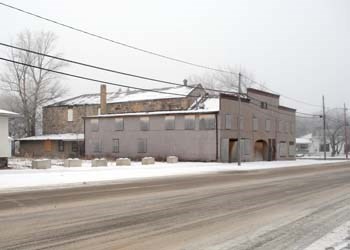A fugitive wanted in Saskatchewan on marijuana production and trafficking charges is scheduled to appear in person at Yorkton Provincial Court December 22.
Luc D’Abadie appeared before Judge Ross Green December 10 by video from jail in Edmonton, Alberta where he is currently remanded pending payment of $7,500 bail on numerous traffic-related charges. As he did at his first Yorkton video appearance in November 13, the suspect refused to be recognized by his legal name, a tactic used by individuals who call themselves “Natural Persons,” “Sovereign Citizens” or “Living Souls” and are loosely associated with a movement which has been dubbed Freemen on the Land or just Freemen.
D’Abadie’s Saskatchewan charges stem from his September 2010 arrest by the Canada Border Service Agency at the Goodlands, Manitoba border where he was trying to enter the United States with a large shipment of marijuana.
The arrest led police to a sophisticated cannabis grow-op in a heritage building known as the Windsor Block in Grenfell, Saskatchewan, which D’Abadie owned at the time.
Nobody is happier with D’Abadie’s recapture and return to face his Saskatchewan charges than people in the town of Grenfell, who are poised to lose a historical landmark.
“It’s uninhabitable now,” said Debra Pinkerton, editor of the Grenfell Sun and Broadview Express newspapers. “It just kills me.”
D’Abadie’s case was before the provincial Court at Broadview for two years before it was adjourned to the Court of Queen’s Bench in December 2012 and the defendant disappeared.
In September 2012, the RCMP Integrated Proceeds of Crime Unit returned the Windsor Block, to the Calgary-based financial group that held D’Abadie’s mortgage, but it was already too late.
“It’s past the point that it can be restored,” said Gary Cole, a town councillor and realtor in Grenfell.
By bylaw, the Windsor Block is a municipal heritage site.
“The heritage value of the Windsor Block lies in its significance as one of the oldest Masonic Halls in Saskatchewan,” states the Town’s bylaw. “Constructed in 1896, the property was reported to be one of the few Masonic-owned buildings in western Canada. The property symbolized the Masons’ confidence in the future of the town. In 1906 the Masons sold the building to businessman J.D. Cumming.
“The heritage value of the property also resides in its status as a long-standing theatre in the community. In 1912, a theatre was incorporated into the Windsor Block, and became an important venue for live performances and travelling vaudeville companies. When electricity was added to the building, motion pictures were introduced. The theatre was in operation until 1974. In the years since, the Windsor Block has hosted a variety of commercial and residential tenants.”
The future of the Windsor Block is currently unclear, but Cole said it will likely be bulldozed soon.
Also unclear at this time is the status of D’Abadie’s case. Dwayne Stone, the former owner/publisher of the local newspapers recalled that at one point D’Abadie had pleaded guilty, but then attempted to have the plea expunged before disappearing.
Federal prosecutor Shane Wagner confirmed that D’Abadie had entered a guilty plea, but has expressed on the record a desire to expunge the plea. He may be entitled to an expungement hearing, but while a guilty plea can be withdrawn if sentencing has not been completed, Wagner said the threshold for its withdrawal is high.
“A plea in open court by an accused represented by counsel is presumptively valid,” states the Criminal Code. “Where the accused is represented by counsel there is a stronger presumption of validity.
“The burden is upon the accused to establish the guilty plea as invalid.”

.png;w=120;h=80;mode=crop)


